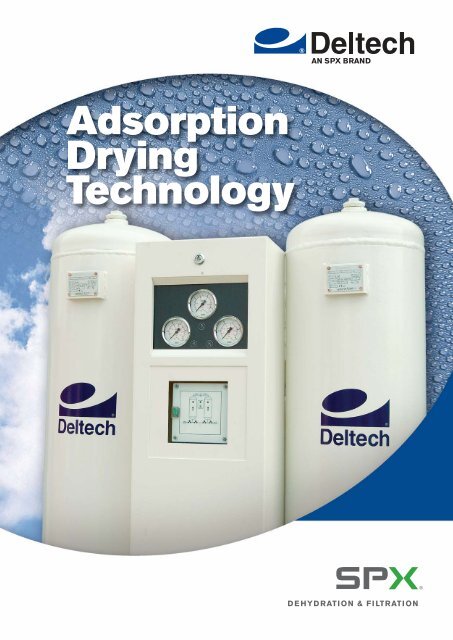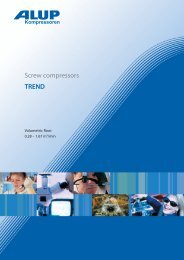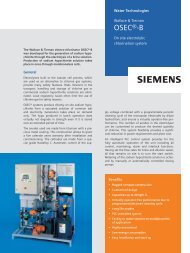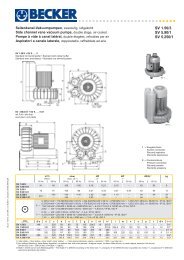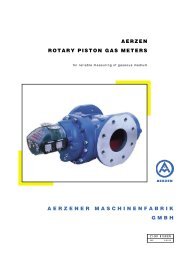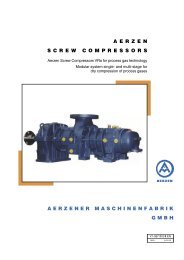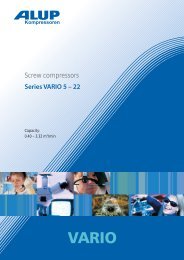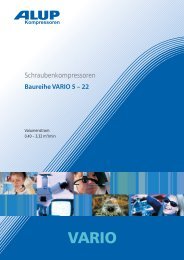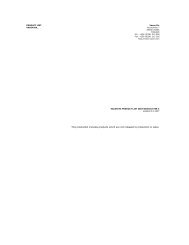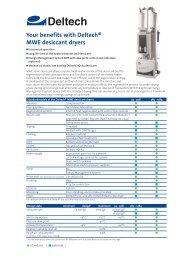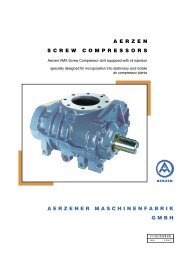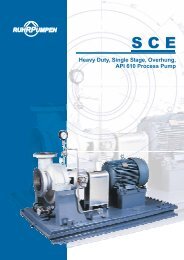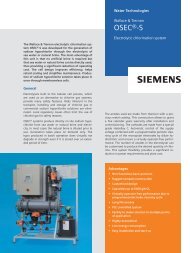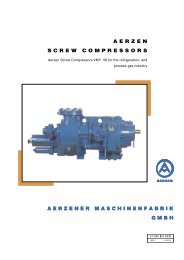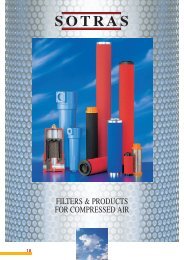Adsorption Drying Technology
Adsorption Drying Technology
Adsorption Drying Technology
You also want an ePaper? Increase the reach of your titles
YUMPU automatically turns print PDFs into web optimized ePapers that Google loves.
<strong>Adsorption</strong><br />
<strong>Drying</strong><br />
<strong>Technology</strong>
<strong>Adsorption</strong> Dryers<br />
Our experience is the best guarantee<br />
for a perfect result!<br />
SPX Dehydration & Filtration is one of<br />
the world’s largest manufacturers of filters<br />
and dryers for compressed air and<br />
other gases. More than 65 years of<br />
experience form the basis of a unique<br />
level of know-how in the area of industrial<br />
application of compressed air<br />
treatment. Our commitment to continuously<br />
improve our products and technologies<br />
has resulted in an extensive<br />
line of adsorption dryers, offering the<br />
highest level of quality, reliability and<br />
economical use. Deltech products are<br />
designed for long-life duty in industrial<br />
environments.<br />
Compressed air is a widely used<br />
source of energy and power. When<br />
used in a production process, the<br />
compressed air must be clean and dry.<br />
Filters trap dust, oil and other contaminations.<br />
Dryers remove water vapour<br />
out of the compressed air. Moisture,<br />
dirt and dust in the airflow can cause<br />
costly problems, such as excessive<br />
wear of pneumatic equipment, blocked<br />
precision apertures, inadequate<br />
measure and control functions, or total<br />
loss of machinery and processes.<br />
Moisture in process applications can<br />
have a detrimental impact on finished<br />
products or initiate undesirable chemical<br />
reactions. At sub-zero temperatures<br />
the moisture in compressed air<br />
lines will freeze, leading to pipe cracking<br />
and in some cases to complete<br />
plant shut-down.<br />
Deltech adsorption dryers protect compressed<br />
air installations and processes<br />
to a pressure dewpoint as low as<br />
-70°C. Depending on the operating<br />
conditions, available regeneration<br />
energy and on the required pressure<br />
dewpoint, Deltech can offer a broad<br />
variety of adsorption dryers.<br />
After being adsorbed in a bed of desiccant<br />
material, the water molecules<br />
need to be removed out of the compressed<br />
air dryer by means of regeneration.<br />
The method of regeneration<br />
must be selected in accordance with<br />
the available means of energy and the<br />
operating conditions. Deltech offers<br />
various regeneration principles, for<br />
most economical use of energy.<br />
Eurodry ED series
for Compressed Air<br />
Heatless-regenerated<br />
adsorption dryers<br />
Heatless regenerated adsorption dryers use a simple regeneration principle, using a<br />
small portion* of the dried compressed air, expanded to atmospheric pressure. This<br />
extremely dry air flows in counter-flow direction through the saturated desiccant and<br />
removes the moisture. The adsorption/regeneration cycle is electronically controlled<br />
and varies from 4 to 10 minutes, depending on the size of the dryer.<br />
Heatless-regenerated adsorption dryers require a minimum of service, are very flexible<br />
in their application and can be installed easily. The relatively short cycle times<br />
allow short on/off switching sequences. In case the dewpoint performance is not too<br />
critical, heatless dryers can be controlled by the running contact of the compressor.<br />
The Eurodry ED and EDC series are heatless adsorption dryers, providing a pressure<br />
dewpoint from -20°C to -70°C. (ISO 8573, class 1-3)<br />
EDC dryers are available in a capacity range from 6 to 240 m³/h, offering many<br />
advantages. This very compact design requires a minimum of floor space. All service<br />
parts are easy to access and the inlet and outlet connections can be chosen on<br />
either side of the dryer, depending on the positioning of the compressor.<br />
Eurodry Compact EDC series<br />
The drying cycle is controlled electronically and features a memory function, which<br />
ensures that the regeneration cycle is completed after re-starting the dryer.<br />
ED series heatless adsorption dryers (capacity range from 160 to 5.950 m³/h) offer a highly reliable performance, combined with<br />
a maximum of economic use. Specially selected inlet valves are pneumatically-controlled and require a minimum of maintenance.<br />
Using a manual setting device, the user can select the required dewpoint and adapt the dryer to varying loads. Inlet and outlet filters<br />
can be fitted to the dryer, forming a compact and complete quality air treatment package. Optionally, a third pressure vessel<br />
can be installed, containing activated carbon. This adsorber will provide technically oil-free air for use in special applications, such<br />
as electronic industry, medical applications and drug and food handling processes.<br />
Optional ED series dryers can be supplied with a dewpoint-controlled cycling device. A highly sensitive dewpoint meter is installed<br />
at the outlet of the dryer and measures the saturation degree of the drying adsorber. The regeneration will not start before the<br />
maximum drying capacity has been reached. Under “low load” operating conditions this device will economize the regeneration<br />
process and save an important quantity of regeneration air.<br />
* Deltech dryers use about 15% of the dry air capacity for regeneration under standard operating conditions according to ISO 7183, for a pressure dewpoint of -40°C.<br />
Energy Management System (EMS)<br />
for heatless adsorption dryers<br />
<strong>Adsorption</strong> dryers have to cope with different operating conditions<br />
and are therefore selected for the most adverse conditions.<br />
According to ISO 7183, the standard operating conditions are:<br />
working temperature 35°C and operating pressure 7 bar gauge.<br />
A higher temperature or a lower operating pressure requires a<br />
higher adsorption and regeneration capacity. On the other side,<br />
during phases of reduced operation (at night, during weekends or<br />
under winter conditions), where the maximum adsorption performance<br />
is not required, the regeneration performance should<br />
continually adapt to the changing conditions.<br />
Energy Management and more ...<br />
The standard cycle-control programme controls the drying and<br />
regeneration phases on a fixed-time basis. The changeover<br />
takes place automatically and timer controlled, independently of<br />
the saturation level of the desiccant. Since the dryer is selected<br />
for the worst operating conditions, the regeneration energy used<br />
will be too much most of the time. In order to avoid this, the use<br />
of a dewpoint-monitoring, load-dependent control system is<br />
recommended.<br />
For this purpose, a high-sensitive humidity sensor is placed at the<br />
outlet of the dryer so that the saturation level of the desiccant<br />
can be monitored. The operator can freely select a dewpoint<br />
between -10°C and -40°C. Once this level is reached, the drying<br />
phase is finished and the regeneration phase started. The result<br />
is an extended drying phase and a delayed regeneration phase.<br />
When the dryer is not working under full load, up to 90% of the<br />
regeneration energy can be saved.<br />
Apart from this, the dewpoint controller provides a display for<br />
operating parameters, energy savings and the necessary service<br />
intervals.
Heat-regenerated adsorption dryers<br />
Over 65 years of experience in the field of<br />
drying and filtration of compressed air have<br />
resulted in a most complete range of heatregenerated<br />
adsorption dryers. The utilisation<br />
of compressed air for the regeneration<br />
of the saturated desiccant is a very expensive<br />
solution. Filtered and dried compressed<br />
air is a very expensive source of<br />
energy, which should possibly not be used<br />
for regeneration. Regeneration takes place<br />
easier and faster if the desiccant is<br />
warmed up. The regeneration air, warmed<br />
up to 180°C, desorbs the humidity out of<br />
the desiccant and transports it out of the<br />
dryer. The energy required is then less<br />
than half compared to the heatless regeneration.<br />
The principle of heat regeneration can be<br />
divided in three groups:<br />
Internally-heated adsorption dryers,<br />
where heating elements are placed in the<br />
desiccant to warm it up.<br />
Externally-heated adsorption dryers,<br />
where air from the environment is aspirated<br />
and electrically warmed-up and<br />
blown through the saturated desiccant.<br />
Heat-of-compression systems, where the<br />
high temperature at the outlet of the<br />
compressor is used for regeneration.<br />
Internally-heated<br />
adsorption dryers<br />
Deltech Serie MWE<br />
These dryers have electrical heating elements<br />
placed into the drying bed which<br />
warm-up the desiccant directly. A minimal<br />
quantity of dried compressed air (about<br />
2.5%) is used to transport the moisture out<br />
of the adsorber and cool the desiccant<br />
down at the end of the regeneration phase.<br />
During changeover, the compressed air<br />
flows through both vessels simultaneously<br />
for about 20 minutes, whereby possible<br />
temperature and dewpoint fluctuations are<br />
balanced.<br />
The utilisation of the optional Energy Management<br />
System results here in significant<br />
energy savings, especially in the case of<br />
changing operating conditions. The MWE<br />
series covers a range of performance from<br />
245 to 4280 m³/h and provide a pressure<br />
dewpoint of down to -40°C (Specification<br />
according to ISO 7183)<br />
MWE Series: Internally-heated <strong>Adsorption</strong> Dryer
Externally-heated adsorption dryers<br />
Delair Serie DB<br />
This heat-regenerated adsorption dryer is the most commonly used in medium-sized to<br />
big-sized compressed air installations (from 350 to 13.000 m³/h). As opposed to the<br />
internally-heated dryers, the heaters used for regeneration are easy to control, simple to<br />
service and they can optionally be combined with steam heating.<br />
In these dryers, the flow during the drying and during the regeneration are both from top<br />
to bottom. This principle offers the following advantages:<br />
An optimal utilisation of the regeneration energy and heat of adsorption<br />
No dewpoints peaks during changeover<br />
Protection against appearance of liquid water<br />
No loss of compressed air for the cooling process<br />
Protection of the desiccant at starting of the compressor and from pressure and flow<br />
fluctuations.<br />
Delair DB dryers do not make use of any compressed air and have a maximal pressure<br />
drop of 0.1 bar. This drying principle also offers the possibility of an Energy Management<br />
System with ample technical and economical advantages. A special option is the<br />
“closed-loop” cooling, which makes it possible to use the dryer with high ambient temperature<br />
or when a pressure dewpoint of -70°C is required. Also under such conditions,<br />
no compressed air is used for regeneration or cooling.<br />
The DB series dryers are simple to operate and are equipped with a display showing<br />
current information and historical operating data. Extra communication modules for connection<br />
with higher-level process control systems are also available.<br />
Heat of compression<br />
Delair XD dryer<br />
The motivation behind the development<br />
of the XD adsorption dryer series was<br />
the desire to make rational use of available<br />
energies. Installations of this series<br />
utilise the heat of compression of the<br />
compressed air for the regeneration of<br />
the saturated desiccant. The compressed<br />
air coming from an oil-free<br />
compressor with a temperature of 110<br />
to 230°C is used for the regeneration<br />
process, before being cooled down to<br />
35°C in the compressor aftercooler.<br />
After being cooled down, the compressed<br />
air is dried to a dewpoint of<br />
0 to -40°C, depending on the available<br />
regeneration temperature. By means of<br />
this procedure no extra energy is needed<br />
and there is no loss of compressed<br />
air. <strong>Drying</strong>, regeneration and cooling<br />
take place under pressure. Because of<br />
this, the mechanical strain on the adsorbent<br />
and the valves is minimal and the<br />
service intervals are extended.
Deltech Hybridryer, the synergy of combination<br />
Certain production processes such as instrument air, air for pneumatic control systems and process engineering solutions, feed air for<br />
the transport of powdery materials in the chemical, pharmaceutical and food processing industries, etc., require dependably treated,<br />
high-quality compressed air - technically oil-free and very dry - with pressure dew points of below 0°C down to -40°C.<br />
If the compressed air is channelled through extensive pipe networks or in areas exposed to ambient weather conditions, disturbances<br />
due to frozen condensate are - especially in winter time - the order of the day.<br />
Here, a flexible dryer type is necessary, which selects the dewpoint depending on the ambient conditions.<br />
The Hybridryer uses the most cost-effective refrigerant dryer system for the air treatment up to +3°C, which removes the main water<br />
load from the compressed air (85%!).<br />
compressed air inlet<br />
compressed air outlet<br />
regeneration<br />
air inlet<br />
fan heater dustfilter<br />
air/air heat<br />
exchanger<br />
dessicant adsobers<br />
regeneration<br />
air outlet<br />
bypass<br />
water separator<br />
and oil finefilter<br />
air/refdrigerant<br />
heat exchanger<br />
condensate drain<br />
The integration of a specially-sized adsorption dryer in<br />
the cold air flow brings about the same compressed air<br />
quality as an adsorption dryer designed for standard<br />
conditions. However, the Hybridryer uses only about<br />
50% of the normally required energy!<br />
This extremely cost-effective technology becomes even<br />
more interesting when the adsorption dryer can be<br />
completely switched off with the automatic by-pass,<br />
which is controlled by the ambient temperature. Under<br />
summer conditions the compressed air is dried by the<br />
refrigeration dryer only, providing a reliable and steady<br />
pressure dewpoint of +3°C. Dropping ambient<br />
temperature will automatically reactivate the desiccant<br />
dryer and the Hybrid combination will dry the<br />
compressed air down to -40°C pressure dew point.<br />
The slightly higher capital investment will be largely<br />
compensated by the considerably lower operation cost.<br />
This makes the Hybridryer a state-of-the-art solution in<br />
the field of compressed air treatment starting from<br />
1000 m³/h.<br />
For further information about this drying system, please<br />
see the detailed brochure
adsorption = g H2O / 100g adsorbent<br />
40<br />
30<br />
20<br />
10<br />
molecular sieve<br />
silicia gel<br />
relative huminity %<br />
ideal condition for the adsorbent activated alumina<br />
activated<br />
alumina<br />
0 20 40 60 50 100<br />
energy consumption W/m 3<br />
20<br />
15<br />
10<br />
5<br />
dew<br />
point<br />
class<br />
1<br />
(-70 ∞C)<br />
heatless regenerative desiccant dryer<br />
= heated regenerative desiccant dryer<br />
2<br />
(-40 ∞C)<br />
3<br />
(-20 ∞C)<br />
Hybridryer<br />
membrane dryer*<br />
4<br />
(+3 ∞C)<br />
refrigeration dryer<br />
dew point classes and their energy requirements<br />
5<br />
(+7 ∞C)<br />
HybriDryer<br />
regenerative desiccant dryer refrigeration dryer<br />
membrane dryer*<br />
* only for small volume flows<br />
6<br />
(+10 ∞C)<br />
200 t<br />
CO2 emissions in 12 months<br />
100 t<br />
desiccant dryer*<br />
dew point -40∞C<br />
C02 reduction<br />
49%<br />
HybriDryer<br />
dew point -40∞C<br />
– flow 5000 m 3 /h in 12 months<br />
*market<br />
standard<br />
investment<br />
HybriDryer<br />
1 2 3 4 5<br />
years<br />
desiccant dryer*<br />
savings<br />
*market standard<br />
CO2 reductions with the HybriDryer<br />
cost savings with the HybriDryer<br />
Deltech filters<br />
complement<br />
the air treatment.<br />
All adsorption dryers use a highly efficient<br />
adsorbent Delsorb HQ, which<br />
has a lifetime of about 5 years under<br />
standard operating conditions. This<br />
durability can be considerably shortened<br />
due to oil, liquid water and other<br />
impurities. For this reason, it is also<br />
necessary to install a dirt filter and an<br />
oil fine filter at the inlet of the dryer.<br />
Since the desiccant produces some<br />
dust as a result of the mechanical and<br />
thermal strain, it is also necessary to<br />
protect the downstream part of the<br />
system with a dust filter.<br />
Deltech offers a complete filter programme,<br />
precisely conceived for the<br />
adsorber series.<br />
Hybrid-Serie DHD
ad_en_11_08<br />
SPX Dehydration & Filtration GmbH<br />
Konrad-Zuse-Straße 25<br />
D-47445 Moers · Germany<br />
Telefon: + 49 (0) 28 41 / 8 19-0<br />
Fax: + 49 (0) 28 41 / 8 19 83<br />
email: deltech@deltech-spx.eu<br />
www.deltech-spx.eu


